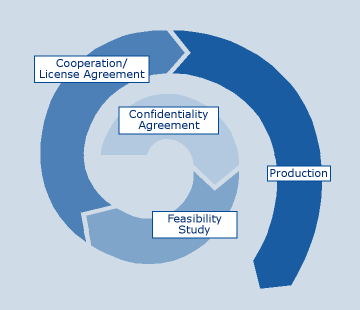Our service: individual surface functionalization solutions
As part of our Molecular Surface Engineering Services, we offer individual surface functionalisation solutions for:
- Slides
- Coverslips
- Beads
- Membranes
- Foils
- Gold surfaces
- Sensor surfaces
Since our foundation in 1996 we have worked in research & development both within large multi-disciplinary, multi-party projects, with large corporations as well as with small & medium sizes companies. Our company organization and production processes enable us to offer very specialized and individual product solutions.
Are you a biotech, pharmaceutics or medical device company? Do you produce sensors or diagnostics products which require high signal-to-noise ratios? Do you want to reduce cell adhesion by adding a low fouling surface to your device or microfluidic consumable?
Then we would like to introduce our MSE-technology to you and discuss possible surface-solutions for your products.
We proceed in five steps:
1. Non-disclosure agreement:
The NDA allows both parties to discuss product improvements frankly, and thus to keep confidentiality about patent information.
2. Proof of concept:
On the basis of our discussion and the material analysis we will develop a functionalization-concept and define the surface-characteristics for the feasibility study.
In order to control the costs for these initial tests we try to use our functionalized slides, membranes and microparticles (beads), if possible. These standard products are readily available in a wide range of different surface functionalizations, so that the optimal surface modification can be selected from our portfolio within a short timeframe and at limited costs.
3. Project/feasibility study:
We functionalize your product. We characterize in detail the material used and analyze the modified surface in order to guarantee a high quality of functionalization. This often involves the development or adaptation of test methods to ensure a constant quality. Usually the surface will be optimized in a multi-step iterative process in order to meet the specific surface requirements for your product.
4. Co-operation/licensing agreement:
Negotiations on exclusive or non-exclusive co-operation.
5. Production:
A production agreement will be discussed on the basis of your annual requirements of the new surface-modified product.

